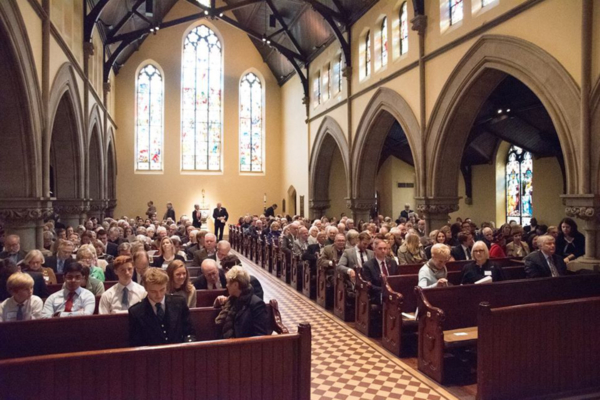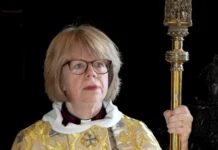[Episcopal News Service] Parish life at Christ Church Georgetown was upended in the span of a single weekend when the coronavirus made an abrupt appearance. It started with church leaders’ March 7 message that all services and gatherings at the Washington, D.C., church would be canceled indefinitely because someone at the church had tested positive.
The rector, the Rev. Timothy Cole, wrote to his congregation a day later, on March 8, with a startling update: “I can now confirm that I am the individual who tested positive for the Coronavirus.” He had been hospitalized and was reported to be in stable condition.
Christ Church Georgetown, just east of the Georgetown University campus, is one of the largest congregations in The Episcopal Church, with an average Sunday attendance of just under 450. Late March 8, the hundreds of parishioners who had visited or attended services at the church on Feb. 24 or between Feb. 28 and March 3 were urged by city health officials to quarantine themselves for 14 days due to possible exposure there to the coronavirus, also known as COVID-19.
Christ Church Georgetown is perhaps the most extreme case yet of the coronavirus disrupting an Episcopal congregation’s everyday life, but disruptions across The Episcopal Church have been widespread.
From diocese to diocese and congregation to congregation, Episcopalians are adjusting to a range of precautionary liturgical changes – including suspension of the common cup at communion and admonition to refrain from intinction, dipping the bread in the wine. Some congregations also are considering Morning Prayer instead of Holy Eucharist, as well as options for streaming services online for parishioners who want, or need, to worship from home.
“In this time when we are all affected by the coronavirus, whether directly or indirectly, whether physically, biologically, psychologically, spiritually, and for many economically, it may be helpful to remember that we’re in this together,” Presiding Bishop Michael Curry said in a written statement to Episcopal News Service. “So look out for your neighbors, look out for each other. Look out for yourselves. Listen to those who have knowledge that can help to guide us medically and help to guide us socially. Do everything that we can to do this together, to respond to each other’s needs and to respond to our own needs.”
Some congregations are finding ways of getting through this together with practical and informal responses, such as stocking and restocking church pews with hand sanitizer and inviting parishioners to decide for themselves whether to politely decline to shake hands at the Peace in favor of a no-contact alternative.
For congregations of the Rosebud Episcopal Mission in South Dakota, the recommended handshake alternative is “soft elbow bumps,” the Rev. Lauren Stanley, presbyter, said in a comment on an Episcopal News Service Facebook post asking readers for examples.
She and other clergy there “have placed hand sanitizer out for people and for me as the priest, I have explained about intincting vs. sipping, and are prepared to stop sharing the wine if COVID-19 is detected in South Dakota,” she said. “If necessary, I will use gloves while distributing the bread. We are making as many plans as possible and will keep talking to our people.”
The virus, with symptoms similar to those of influenza, had been confirmed in 104 countries as of March 9. Most of the 110,000 cases and 3,800 deaths globally have occurred in China, according to the World Health Organization, though its ongoing spread to the United States and other countries has sounded alarms around the world. The Centers for Disease Control and Prevention reported 423 cases within the United States as of March 9, including 19 deaths. Washington, D.C., and 34 states have reported at least one case.
The virus’s economic toll already is being felt globally, with factories, businesses and schools closing temporarily in some places, and the travel industry is in crisis mode over canceled reservations and trips.
Those cancelations include Anglican and Episcopal delegations to the 64th annual United Nations Commission on the Status of Women and The Episcopal Church’s House of Bishops, which had planned to gather this week at Camp Allen in Texas for a regular meeting. The House of Bishops meeting itself wasn’t canceled, but Curry chose to convert it to a “virtual gathering” rather than risk potential coronavirus spread among the bishops who would be traveling from all corners of the church.
“The benefits of an in-person meeting do not clearly outweigh the potential public and personal health risks that could arise from gathering 130 people from around the U.S. and multiple other countries — who would travel through multiple airports, interact with personnel at the camp, then travel again home,” Curry said.
Instead, the bishops will participate in three-hour online meetings each day March 10-12 that will alternate between plenary sessions and small-group video discussions.
The Episcopal Church also has limited official international travel. Church staff members were advised on Feb. 26 that travel to China, South Korea, Japan, Iran, Italy and Hong Kong is suspended, and anyone traveling from those countries is asked to self-quarantine for 14 days to ensure they don’t have the coronavirus.
Diocesan bishops have taken the lead in providing local guidance to Episcopalians and their congregations, and their advice and directives are evolving rapidly as the outbreak worsens.
Some of the dioceses hit hardest and earliest by the outbreak were those on the West Coast, and several of those bishops responded by asking their congregations to temporarily suspend use of the common cup.
“The COVID-19 spread is a rapidly changing issue in our lives, and even more so in King County and Western Washington,” Olympia Bishop Greg Rickel said in a March 4 message to his diocese. “We have, sadly, become the epicenter of this event in the U.S. for the moment.”
Among the cases reported in the diocese was a member of Emmanuel Episcopal Church on Mercer Island, just east of Seattle. That church chose to cancel its worship services March 8 while the facilities were being cleaned following CDC guidelines.
Rickel directed all his congregations to stop using the common cup. Los Angeles Bishop John Harvey Taylor and California Bishop Marc Andrus soon issued similar directions to congregations in their dioceses. And on March 9, Washington Bishop Mariann Budde responded to the news at Christ Church Georgetown and other coronavirus cases in the region by issuing updated recommendations to her diocese that included suspension of the common cup and distribution of wine during communion.
She also thanked members of her diocese “for your thoughtful, calm leadership, concern for the most vulnerable among us, continued prayers for those who have been adversely affected by this outbreak and willingness to make difficult adjustments for the common good.”
Numerous bishops also have included reminders in their messages to their dioceses that Episcopalians are not required to take both the bread and wine at communion.
“A worshiper’s individual health needs may preclude taking either the bread or the wine,” Maryland Bishop Eugene Sutton said in a Feb 28 message to his diocese.
He also discouraged the practice of intinction, because a person’s fingers may accidentally touch and contaminate the wine. Several other bishops have raised the same issue, going as far as to tell worshippers to stop intinction because it is less safe. Fond du Lac Bishop Matthew Gunter is among them.
“We need not succumb to a spirit of fear. We will continue to gather for worship because that is what we do as Christians,” Gunter said in a March 2 message advising precautions for communion. “Still, the assurance of faith does not mean that we do not exercise proper prudence and care for ourselves and one another.”
Episcopal Relief & Development has issued a summary of faith-based responses to the spread of the coronavirus, including printed resources for church bulletins. Dioceses and congregations are helping to disseminate such resources to their followers, as well as health experts’ recommendations for preventing the virus’s spread and responding to illness.
“What’s happening is that people’s awareness of the virus and its potential impact is just changing, increasing and changing rapidly,” said Jim Naughton of Canticle Communications, a public relations firm whose clients include several Episcopal dioceses and congregations. “This virus is going to be so disruptive that common things in the life of almost every American are potentially going to change,” he told ENS in a phone in interview.
The case of Christ Church Georgetown underscores that point, Naughton said. What happens in a congregation if its priest becomes sick with coronavirus? That may become a bigger question than how to handle the common cup, he said.
ENS left email messages with Christ Church Georgetown’s two associate rectors and its senior and junior wardens, but they did not reply in time for this story.
The Rev. Timothy Cole, rector of Christ Church Georgetown. Photo: Christ Church, via Facebook
Cole, rector of Christ Church, had recently returned from Louisville, Kentucky, after attending the annual gathering of the Consortium of Endowed Episcopal Parishes, or CEEP, which ran from Feb. 19 to 22. CEEP leaders are “monitoring the recommendations given to organizers of other conferences where attendees have tested positive,” CEEP Executive Director Joe Swimmer said in an email to attendees. “So far, their expert opinion has been that simply attending a conference with someone who tests positive is not a risk factor.” A follow-up message from CEEP cited D.C. health officials’ conclusion that there was “no identified risk of exposure” to conference attendees.
Cole said in the message to his congregation that he would have to remain quarantined for 14 days, but he advised parishioners that he was doing fine. “I am receiving excellent care and am in good spirits under the circumstances,” he said.
Naughton recommends that congregations and dioceses plan now for how they would respond to escalating developments in the coronavirus outbreak – and, equally important, how they will explain their decisions to their congregations and the general public.
“A concern for public health and the good of the community and the individual health of the members of the parish, that has to be paramount,” Naughton said. “But we’re doing it in the context of balancing it with our devotion to our traditions.”
One way that some church leaders are looking to strike that balance is through online worship services. After Emmanuel Episcopal Church in the Diocese of Olympia chose to cancel its Eucharist because a member was found to have coronavirus, its rector, the Rev. Elizabeth Riley, hosted a live video of a Morning Prayer service March 8 on Facebook.
That service was followed by a “virtual coffee hour” using the video chat tool Zoom.
Sarah Stonesifer Boylan, who serves as digital missioner for Virginia Theological Seminary’s Lifelong Learning Department, recommends Zoom for other congregations interested in offering online worship services to their parishioners. Zoom enables a dynamic re-creation of the church community online through chat and video sharing, she said. Some congregations also may consider Facebook streams, which allow some interaction.
She offered some best practices for streaming worship services during a virtual workshop March 9 hosted by the Rev. Bruce Reyes-Chow, a Presbyterian pastor in San Francisco, California.
“There’s a lot of anxiety happening on how communities can still gather and how we can be a support to each other as part of the body of Christ,” she said. That anxiety was further heightened by the news this week at Christ Church Georgetown.
“There’s a realization that it is hard for communities to gather at this point,” said Stonesifer Boylan, who also serves on The Episcopal Church’s Executive Council. “How can we be the community that Jesus calls us to be without actually gathering in person because of that safety issue?”



